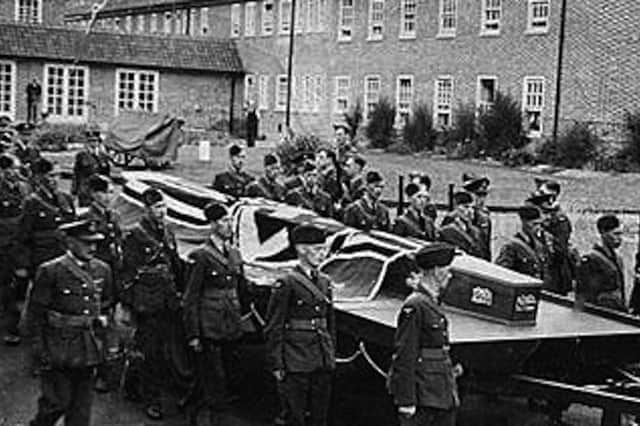Admirable respect between enemies when German plane crashes at Rowlands Castle | Nostalgia


They are interred in Thorney Island churchyard CWGC cemetery. The three were given an honour funeral although the coffins were not carried on a gun carriage but what looks like a flat-top wagon of sorts.
The coffins have, I believe, been draped in German flags although they may be Luftwaffe ensigns.
Advertisement
Hide AdAdvertisement
Hide AdTo the far right of the image, we can see a Guard of Honour with rifles at the general salute although without fixed bayonets which would be usual for a British funeral.
Marching alongside the coffins are British airmen who most probably formed the burial party.
To think that at any other time, these men would have been attempting to kill each other defending the homelands.
The respect being shown to the three is admirable.
I wonder if the same respect was shown to RAF pilots shot down over German occupied Europe.
Advertisement
Hide AdAdvertisement
Hide AdIf anyone has more information please let me know. Thank you.
I must thank Trevor Dalgleish and Memories of old Westbourne, Southbourne, Prinstead and Thorney Island Facebook page for allowing me the courtesy to print this photograph.
:: I see the railway companies are going to issue new season tickets available for a few days of a month.
If the railway companies want to attract more passengers than they could no better then re-introduce the runabout ticket.
Advertisement
Hide AdAdvertisement
Hide AdWhen I was a boy, the Southern Region of British Railways sold cardboard tickets with a map on the reverse side. For the sum of, as I remember, 10/- (50p) I could purchase the ticket which would allow me travel for a week from, say, Portsmouth to Chichester, across to Fareham and up to Petersfield.
A 75p ticket, way above my pocket money, would be valid from Portsmouth to Southampton, across to Brighton and up to Guildford. It was marvellous value and during the school holidays I would travel all over the region several times. The tickets were only valid for certain times of the day.
With the school summer holidays to begin shortly I am sure re-introducing the scheme would be a winner.
:: After the Battle of Trafalgar, the Royal Navy was without a rival for a hundred years until a challenger appeared on the other side of the North Sea.
Advertisement
Hide AdAdvertisement
Hide AdThe German navy became an equal to the British Navy until the launching of HMS Dreadnought, built in Portsmouth Dockyard in a year and a day.
During the First World War, naval intelligence was based in the Admiralty in Whitehall, London. It became known as 'Room 40' and was just about the most secret location anywhere in the British Isles.
The room was established by the brilliant Admiral Sir Reginald Hall, Director of Naval Intelligence in 1914. I honestly do not think people of his calibre exist today.
The men employed in 'Room 40’ were not all naval men but college fellows; professors; a Director of the Bank of England; a well-known actor; a music critic; a publisher and a dress designer were all employed.
Advertisement
Hide AdAdvertisement
Hide AdWith increased workload Admiral Hall proposed to employ women. Women employed in a department dealing in secret matters was something original and quite new.
Hall laid down the strict rule that women had to be closely connected to the navy, daughters and sisters of officers, had to know two foreign languages and be able to type. If they could take shorthand so much the better.
Admiral Hall had the nickname ‘Blinkers Hall’ and the women soon became known as ‘Blinkers’ Beauty Chorus’ although beauty was not one of the requirements for the job. Hall’s departure from precedent was later amply justified.
I can just imagine the outcry if such a phrase in recognition of women was used today.
Advertisement
Hide AdAdvertisement
Hide Ad:: If you look at the chart of Hayling Island’s south coast you will see Church Rocks – at one time a favourite place for local sea anglers to fish.
The reason it’s called Church Rocks is that legend has it that Hayling Island was at one time another half to a mile longer than it is today.
In the Middle Ages there was considerable erosion, perhaps a minor tsunami hit the island and much of the land remained under the sea.
A church is supposed to have disappeared under the waves but did not collapse.
For many years after, fishermen in their boats above where the church stood said they could hear the church bells ringing as the tide ebbed and flowed.